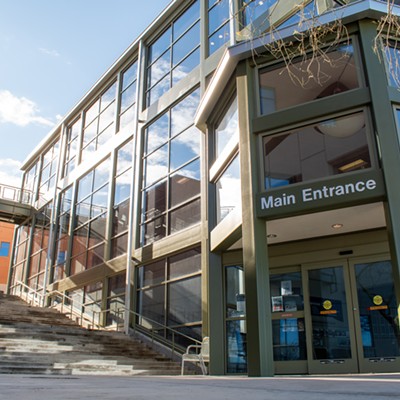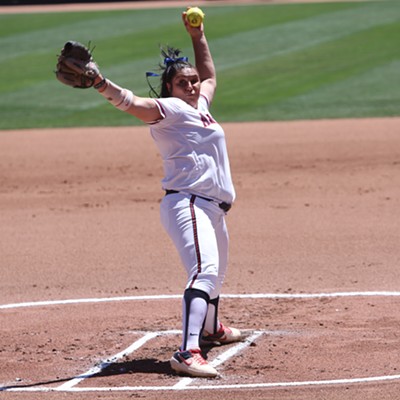Pima Community College has instituted a differential tuition system for a handful of programs that it says are more expensive than normal to offer and operate.
The differential, which applies to classes in 17 of Pima's 131 programs, was approved in April and goes into effect for the spring 2012 semester.
But it wasn't until the roughly 3,300 students affected by the differential were sent an email on Oct. 3 detailing the increase that they were directly informed of the tuition change, some students say.
"It would have been nice to know a little earlier," said Krystal Parrish, a 28-year-old student in her first year of Pima's Radiologic Technology Program. "It would have been nice to hear about it in the summer, when I started. Instead, it's like, 'Oh, yeah, you're halfway through your first semester, and, oh, by the way, it's going to cost more.'"
Debbie Yoklic, Pima's assistant vice chancellor, said forums were held with students at Pima's west and downtown campuses in March to discuss the differential, while faculty members in affected programs have been involved even longer in the decision-making process. Additionally, she said, the school's newspaper wrote about the PCC governing board's approval in April, and some programs, such as nursing, put information about the differential in its program handbook, which all students needed to sign.
The decision to send out the Oct. 3 email was made in an effort to give those affected "some warning" about the increase prior to students starting to register and pay for spring classes in November, Yoklic said. In hindsight, she said, direct notification could have been done earlier, but she feared that if students were contacted too early, they'd either ignore the information or "think it's happening now and get worked up too early."
The base tuition rate for Pima classes in the spring will remain $58.50 per credit hour for in-state students. Students in nine programs will instead pay $76 per credit, while students in eight other programs will pay $82 per credit. (See the chart for more information.)
All told, less than 10 percent of Pima's approximately 33,800 enrolled students will be affected by the differential, said school spokesman C.J. Karamargin. He added that the increase only applies to classes specific to certain programs, not required prerequisites such as math or English.
Yoklic said certain programs were singled out because of their extremely high instruction costs. The 17 programs cost at least twice as much as the median program. (All programs were ranked from cheapest to most-expensive for two consecutive school years.) The $76-per-credit classes cost two to 3.9 times as much as the median, while the $82-per-credit classes cost at least four times as much to operate, according to an informational page detailing the increases on Pima's website (www.pima.edu/costs/
costpayments/differential-tuition.shtml).
By charging extra for more-expensive programs, Yoklic said, not only will Pima be able to recoup some of these extra costs, which will go to the school's general fund; the increased fees will give those programs extra "political clout," because it shows those students are paying more to go to Pima. In other words, it will make it less likely that those programs would get cut, she said.
"Chancellor (Roy) Flores is committed to protecting programs," Yoklic said. "With that rationale, it's necessary to find a way to protect programs. The differential tuition is an attempt to protect programs, especially those that don't have a lot of students."
Programs that are part of the differential may change from year to year, Yoklic said, depending on whether they continue to cost at least as twice as much as other classes for two consecutive years. She said about six programs could be added to the list for the fall 2012 semester, while any currently on the list could be dropped from the differential list. Those decisions won't be made until a full audit of costs is complete early next spring, Yoklic said.
Pima is the first community college in the state to implement a differential, a funding instrument that has been present in four-year colleges for several years. The University of Arizona has a variety of differentials for certain programs, some in the form of increased tuition rates, and others in program fees.
Yoklic said she is unaware of any other community colleges in Arizona that are considering such a move, though Cochise College spokeswoman Liz Manring said officials at her school are "in the very early stages of talking" about a tuition differential.
Despite the increase, Yoklic said Pima's tuition is still very affordable compared to other community colleges in Arizona. The 10 schools in the Maricopa Community College system charge $76 per credit hour for in-state students, for example.
Parrish, the radiologic technology student, said the differential will mean that she needs to pay about $350 more in the spring. That money is covered by financial aid, she said, though it will mean that she'll have less excess aid to help her pay bills.
Though she's unhappy about the increase, she said it's still far better than the approximately $30,000 it would cost over two years for her to get a similar radiologic technology degree at a private institution in Tucson.
Prices Going Up
Starting in the spring, Pima Community College will charge students taking classes in 17 programs a higher rate. Instead of $58.50 per credit for in-state students, affected students will pay either $76 or $82 per credit for classes in the following programs:
$76 per credit
• Aviation technology
• Machine tool technology
• Massage therapy
• Music studies instruction
• Respiratory technology
• Technology
• Travel industry operations
• Veterinary technology
• Welding
$82 per credit
• Clinical research coordinator
• Dental assisting education
• Dental hygiene
• Dental lab technology
• Fashion design and clothing
• Medical laboratory technology
• Nursing
• Radiologic technology












